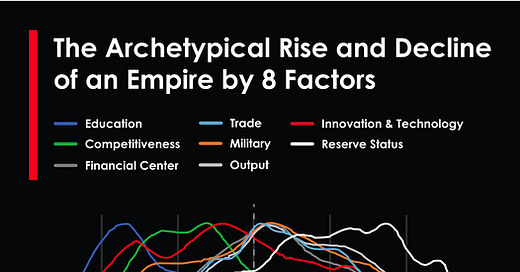
Education And The Changing World Order
Why We Should Invest In Educating Citizens Of The Internet
Principles for Dealing with the Changing World Order by Ray Dalio and The Sovereign Individual by James Dale Davidson and William Rees-Mogg come to a similar conclusion - the current world order is about to go through a significant change.
In Principles for Dealing with the Changing World Order, Ray Dalio shows how global superpowers go through a general rise and fall of power. From the Netherlands to the United Kingdom to the United States, each country has gone through a similar rise and fall. Dalio makes the case that the US is in decline and China is on the rise.
The following graph shows this dynamic:
The Sovereign Individual makes a different case. The authors argue that the digital revolution changes the world order in a different way. The digital revolution will reduce the power of the nation state and give more power to the “citizens of the internet.”
The digital revolution takes power from the state because it makes borders less important. As I write in Thoughts on The Sovereign Individual, technology empowers the individual and gives less power to the state because:
Remote work gives us more mobility
The metaverse gives us the ability to make money in the digital world
Crypto gives us the ability to store wealth outside of the control of government
Taking the main points of Principles for Dealing with the Changing World Order and The Sovereign Individual at face value (there are strong arguments to be made against each thesis that are out of the scope of this post), we can simplify the current state of the world as follows:
The US is in decline and China is on the rise
But, the internet economy is large, important, and also on the rise
This summary forced me to ask the following question: “what if the decentralized, global internet is a more important force than existing nation states?”
Balaji Srinivasan’s idea of a centralized East vs a decentralized West is a similar way of looking at this question.

Education for Citizens of the Internet
In Principles for Dealing with the Changing World Order, Ray Dalio also studies major factors that contribute to an empire’s rise and fall. He shares this graph:
From the graph, it is clear that strong education is an early indicator of strength. Or, you could make the case that strong education leads to a strong empire.
If we take the leap of faith and call the internet economy a new type of nation and the importance of education shown in this graph is directionally correct, we can make the following argument:
To build a strong internet economy, our initial priority must be to heavily invest in education for citizens of the internet or players in the great online game.1
From my experience building education programs on the internet, here are a few suggestions on how we make the best possible education experience for citizens of the internet:
Learning Through Action. We should emphasize learning through experimentation and tinkering over lectures and exams
Community Focus. Cohort-based courses have show how building community around a topic increases learning participation and completion
Creating Over Credentials. The internet gives us the ability to show more of our work through what we build rather than credentials handed by institutions. More here: The Future of Education Looks Like YC
Aligned Incentives. Education programs should attempt to be as closely aligned with the students’ end goal as possible. This means that education should focus on the output and real world progress of the student. In this model, we can help students learn while also creating value in the real world. More here: In the future of education, incentives matter
A definite purpose, integrated crypto, and a plan to meet in person. Education institutions should consider Balaji Srinivasan’s idea of The Network State to help build strong institutions. More here: The Rise of The Network University
Using these five ideas as a starting point, we can build impactful educational institutions for citizens of the internet.
By investing in education early in the life of the decentralized, global internet economy, we can build a prosperous environment for the citizens of the internet.
Citizens of the internet do not fit nicely into our existing ideas of citizens of a nation state. What does it mean to be a citizen of the internet? One mental model is that citizens of the internet are players of The Great Online Game. I suggest reading Packy McCormick’s The Great Online Game to learn more.












YES! The best universities in the world today are Coursera, Udemy, Khan Academy, and Codecademy... Not Stanford or Beijing University. The next empire is the cyberspace (neither China nor the US)!
Very nice, man. It's so interesting to think about how education should change in the internet age, and it's cool to be able to learn from your experience. It's a cool setup too to weigh the thesis of the Changing World Order against the Soverign Individual. I feel like there's room for a lot of exploration there.